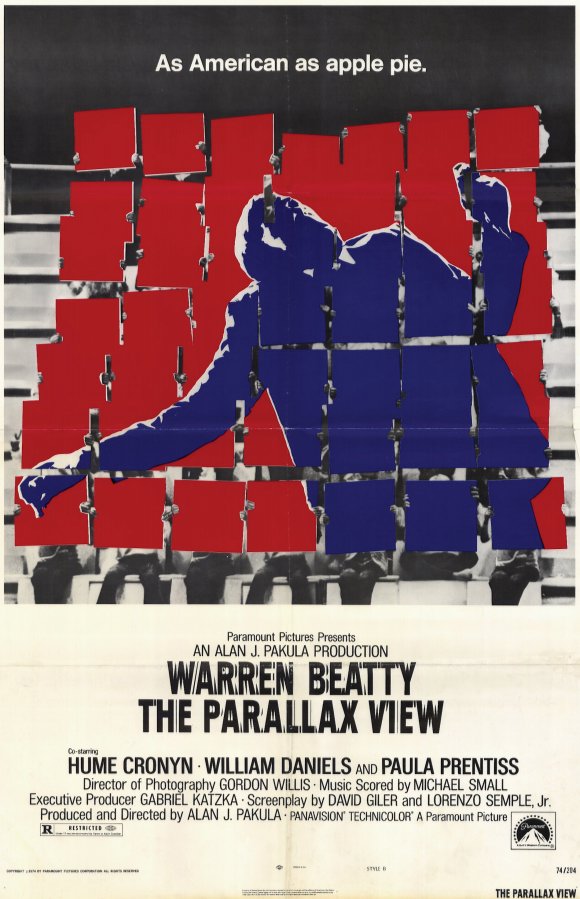Damon Smith on Southland Tales and The Parallax View
Reverse Shot
“The pure products of America/go crazy”—William Carlos Williams

Paranoia has been out of fashion in the movies since the 1970s. After Oliver Stone’s JFK, the last serious Hollywood-style entry of the post-Kennedy era to posit a hinky what-if conspiratorial scenario, Richard Donner’s execrable Conspiracy Theory, featuring a wild-eyed, motor-mouthed Mel Gibson, demonstrated how marginalized and discredited such tortuously convoluted mindsets had become to the mainstream. In the late ’90s, the American empire was flourishing, and world conflict seemed distant. The X-Files movie, created by Paranoiac-in-Chief Chris Carter, was more an homage to TV’s favorite paranormal investigators Mulder and Scully than it was an attempt to version reality; it was character-based rather than event-driven. But the tragedy of 9/11 roiled all the old fears about government deception, and the culture industry set about its work: Jonathan Demme remade The Manchurian Candidate, AMC created the series Rubicon, modeled after the classic paranoid thrillers, and the Truth Movement gained a foothold, thanks to the Internet-distributed documentary Loose Change. This film, a farrago of irresponsible, sensationalized conjecture, stoked the imagination of those primed to believe that the Bush administration had either orchestrated the attacks on the Pentagon and the World Trade Center towers, or had allowed the hijackers to implement mass murder in accordance with a neo-conservative ideology hatched under the aegis of William Kristol and Robert Kagan’s Project for the New American Century. Theories like these proved that the will to believe anything was still a feature of American public discourse and its politically disenfranchised classes.
By late 2007, as critics dutifully compiled their year-end best-of lists, one film in particular seemed to be vying with Paul Thomas Anderson’s There Will Be Blood (an allegory of capitalism-as-madness) for the grand prize of over-the-top, deranged masterpiece: Richard Kelly’s Southland Tales, an independently financed, studio-distributed amalgam of Biblical and pop-cultural prophesying spiked with a heady dose of security-state paranoia. Unlike films of the earlier era—Executive Action and Marathon Man, The Conversation and Three Days of the Condor—or present-day thrillers which sought to explain world events in terms of secret political or corporate rationales (Michael Clayton’s tagline: “The truth can be adjusted”), Kelly’s logic-defying Southland Tales was a baffling exercise in futuristic, sci-fi apocalyptica that appears to have burst like a loose, baggy monster from the director’s adolescent id.
The story, like the film itself, is incredibly knotted and nearly impossible to summarize. It doesn’t help that the movie begins with an atomic bomb exploding on the Fourth of July 2008 in Abilene, Texas, and the onset of World War III in the Axis of Evil nations, information conveyed to us by a narrator, Pilot Abilene (Justin Timberlake), who happens to be a badly disfigured Iraq War veteran and drug addict. From there, we enter the world of an amnesiac, Republican Party–connected action-movie star, Boxer Santaros (Dwayne “The Rock” Johnson), who, after vanishing in the Nevada desert for several days, returns believing he is Jericho Kane, a fictional character from a screenplay he’s co-written with celebrity porn star and talk-show host Krysta Now (Sarah Michelle Gellar) about the end of the world. The reasons for his disappearance have to do with the machinations of an evil baron (Wallace Shawn), a troupe of culture-jamming neo-Marxist renegades, the advent of new government program USIdent, and the tortured recollections of L.A. police officer and Fallujah survivor (Seann William Scott). Got all that?
To Read the Rest of the Essay

No comments:
Post a Comment